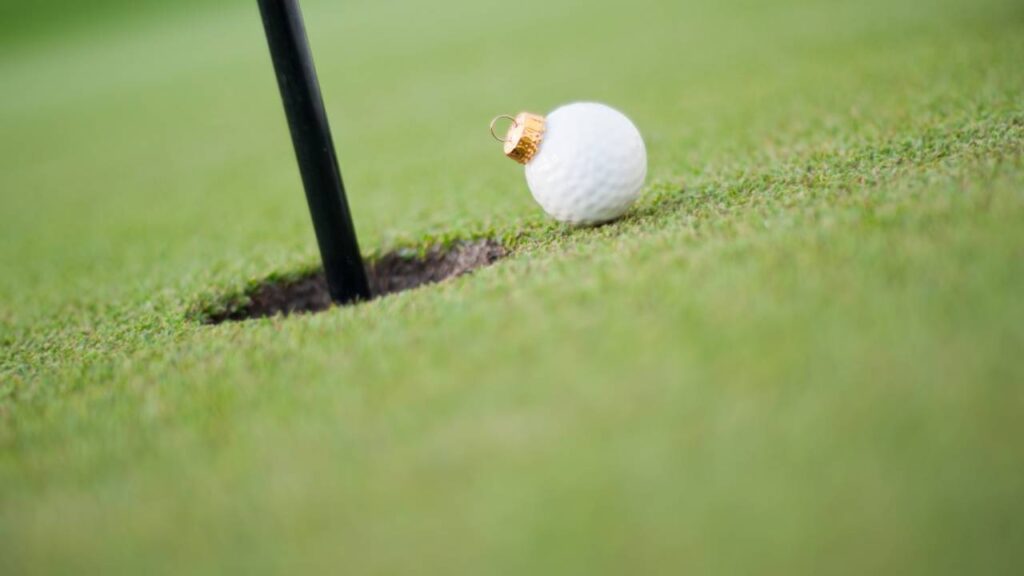Mastering Fourball: Understanding Golf’s Most Dynamic Format
- Last updated on July 22, 2023
- Toni Benedito
- Golf Courses, Blog
Fourball is a golf format where two pairs of golfers compete against each other, with each player playing their own ball throughout the round. The best score from each team on each hole counts toward the team’s score. This format requires strategic gameplay and is popular in professional golf tournaments such as the Ryder Cup and the Presidents Cup.

Key Takeaways
- Fourball, also known as “best ball,” is a golf format played by two teams of two players each.
- Each player plays their own ball, and only the best score from each team on each hole counts toward the team’s score.
- Fourball is commonly used in professional golf tournaments like the Ryder Cup and Presidents Cup, providing exciting matchups between teams from different countries.
- Strategies in fourball can vary from playing aggressively to conservatively or using a hybrid approach, depending on the situation.
- Observing proper etiquette, such as being on time, respecting other players, and adhering to rules, ensures an enjoyable experience during fourball matches.
Introduction
Golf enthusiasts are familiar with the different golf formats used in golf tournaments, such as match play, stroke play, and best ball. However, fourball is a popular format that provides unique gameplay and strategic opportunities. In this article, we’ll delve into what “fourball” is in golf.
Fourball is a golf format played between two pairs of golfers. Each pair plays as a team against the other pair. Hence, it’s sometimes referred to as a “partnership” or “contest”. Each player plays his or her own ball throughout the round independently of their partner.
In fourball, only the best score from each team on each hole counts toward the team’s score. This means that if one player of a pair scores a 4 on a hole while the other scores a 5, then the team’s score for that hole will be 4.
The team with the lowest combined score after all holes are completed wins. While this may seem like an advantage for players since they can choose to take their partner’s better score when they’ve had trouble on their own shot, which is known as using your partner’s ball, it also comes with some disadvantages since players can’t rely solely on their teammate to carry them through every round.
"In fourball, only the best score from each team on each hole counts toward the team's score. This means that if one player of a pair scores a 4 on a hole while the other scores a 5, then the team's score for that hole will be 4."
Fourball is commonly played in professional golf tournaments and championships worldwide. Some examples include the Ryder Cup and Presidents Cup for men’s professional golfers and the Solheim Cup for women’s professional golfers.
Playing fourball requires good strategy and tactics from both members of each team. Since only one score counts per hole, players need to decide whether to play it safe or take risks that might end up costing them strokes if they don’t succeed.
Fourball is an exciting format that encourages teamwork while also allowing individual performances to shine through. It allows skilled players to showcase their abilities while making it possible for amateurs to have fun playing alongside more experienced partners or opponents.

Check out this video below from SwingU‘s Youtube channel explaining the rules pertaining to the four-ball format:
Understanding Fourball
Fourball is a type of golf game that is played by two teams of two players each. It’s also known as “best ball” because the score for each hole is determined by taking the best individual score recorded by one of the players on each team.
In other words, if one player on a team scores a 4 and the other scores a 6, the team’s score for that hole is 4. The main difference between fourball and other types of golf games like foursomes is that in fourball, both players on a team play their own ball from tee to green.
This means that there are four balls in play at any given time during the game. This makes it more enjoyable for enthusiasts who love to watch golfers hit great shots and allows for more competition between teams. One advantage of playing four-ball is that it allows partners to mix and match their strengths and weaknesses. For example, if one player has an excellent short game but struggles with his long ball, his partner can pick up the slack with long drives.
This makes for an exciting game where tactics come into play as partners strategize how to use their different strengths to gain an advantage. However, playing with partners also comes with its disadvantages.
"If one player on a team scores a 4 and the other scores a 6, the team's score for that hole is 4. The main difference between fourball and other types of golf games like foursomes is that in fourball, both players on a team play their own ball from tee to green.
If one player has a particularly bad hole or day, it can negatively impact the score for both players on the team. It’s important for teammates to communicate well and work together through tough spots in order to keep their focus.
Overall, fourball is a fun and exciting way to enjoy golf tournaments or compete against friends. With its unique regulations and strategies involved, it offers enthusiasts plenty of opportunities to improve their handicap while enjoying some friendly competition with others who share their love of golfing.
Enjoying this article? Read more:

Rules of Fourball
In fourball, each golfer plays their own ball throughout the game. This means that each golfer is responsible for their own score on each hole. The team’s score is determined by the lowest score among the two golfers on the team.
For example, if golfer A scores a 4 and golfer B scores a 5 on a hole, then the team’s score for that hole is 4. One of the key rules in four-ball is that there are no limits to how many times a golfer can use their partner’s advice or suggestions before making a shot. Golfers can talk to each other about strategy and approach as much as they want, which makes it an excellent format for golf enthusiasts who want to play together and improve their golf swing.
Another important rule in fourball is that each player must play their own ball from tee to green. This means that if one golfer hits their ball out of bounds or loses it, they will have to take a penalty stroke and hit again from where they last played. It also means that both players do not have to hit from the same spot on every shot; they can choose whichever approach gives them an advantage.
Fourball can be played as stroke play or match play. In stroke play, teams are ranked based on the total strokes taken over all holes played during the round. In match play, teams compete against each other hole by hole based on who has the lowest score for that particular hole. The difference between these two formats affects how golfers approach strategy and competition throughout golf tournaments.
Fourball is an exciting format that allows individual golfers to shine while still contributing to a team effort. Whether playing with friends at your local golf club or competing in professional tournaments like Ryder Cup events, knowing these rules will help you improve your approach and chances of success when playing this dynamic format of golf partnership!

Fourball in Professional Golf
Fourball is a popular format in professional golf. It is also known as “better ball’ and is considered one of the most exciting formats of the game.
In this format, two players comprise a team, each playing their own ball throughout the round. Their scores get compared on each hole, with the lowest score winning that particular hole. In professional golf, fourball is often used in match-play contests.
The Ryder Cup is an example of a competition where fourball is extensively used. The structure of these contests offers exciting matchups between teams from different countries battling it out against each other to win bragging rights for their nation. Golf enthusiasts eagerly anticipate these competitions to watch their favorite players compete against each other.
Like any other golf format used in professional play, fourball has its advantages and disadvantages. One major advantage that makes fourball ideal for top-level competitions is that it allows both players to showcase their skills independently without any pressure or interference from their partner’s shot.
"In professional golf, fourball is often used in match-play contests. The Ryder Cup is an example of a competition where fourball is extensively used."
This helps ensure that only the best golfers are chosen to represent their country or team. However, one disadvantage of fourball is deciding which player’s shot should be taken if both partners have hit good shots on a hole.
This decision needs to be made quickly and can sometimes lead to confusion and mistakes. Strategies are critical in fourball, as working together as allies can help increase your chances of winning a hole or two throughout the round since partners can pick up where one leaves off by playing different approaches depending on distance or difficulty level.
It’s essential to choose your partner wisely so that you complement each other’s strengths and weaknesses well enough to form an effective alliance. Fourball has become an integral part of professional golf tournaments worldwide because it brings excitement and entertainment through its competitive nature while allowing top-quality players to display their skills independently without any pressure from teammates or opponents during playtime.
Check out this video below from the Golf Distillery’s Youtube channel on how to play the four-ball golf format used at the Ryder Cup and Presidents Cup:
Strategies for Fourball
Diving into the world of fourball golf implicates team effort and collaboration. As a player, the key to achieving success is to coordinate effectively with your teammate, strategizing ways that enhance your winning prospects. Just like in any other sport, fourball golf calls for dynamic strategy formation, whether it be playing with aggression, adopting a conservative stance, or combining both in a hybrid approach.
Key strategies include:
Playing Aggressively: This strategy involves aiming for big shots, despite a touch of risk. The principle behind it is that if one player nails an impressive shot while the other player chooses a safer path, the duo can gain an upper hand against their competitors. Yet, it’s worth noting that if both players fail their shots, they may find themselves trailing.
Playing Conservatively: The conservative approach emphasizes playing safe rather than perfect. Players aim to dodge risks and maintain their scores as low as possible, which works well for teams that avoid unnecessary gambles and have the confidence to secure par on most holes.
Hybrid Approach: A mix of aggressive and conservative play can prove effective in varying circumstances. For example, on a challenging par-3 hole, one player might opt for a safe play while the other takes a chance. In contrast, on easier holes where a birdie seems probable, both players might go for bolder shots.
Besides these strategies, a successful game of fourball golf also hinges on unique tactics. The initial step entails sitting down with your partner to discuss your individual strengths and weaknesses. For instance, if a player excels at hitting irons but struggles off the tee box, they might choose to tee off on odd-numbered holes, while their partner takes the even-numbered tees. Knowing the opponent’s strengths in advance can help in crafting an effective game plan.
The path to fourball golf success is paved with strategic thinking, effective communication, and skillful execution. By harnessing these strategies and tactics and aligning them with your team’s strengths, you and your partner can construct a game plan that lays the groundwork for success. The reward of careful planning and practice is a well-deserved triumph in fourball golf.

The Importance of Etiquette in Fourball Golf
In the realm of fourball golf, observing the proper etiquette not only shapes the overall game experience but also enhances the sense of camaraderie among players. Adhering to certain guidelines helps ensure that all players can enjoy the game seamlessly and promotes a competitive yet respectful environment. Below are some essential rules of conduct that players must keep in mind while engaging in fourball matches.
Key considerations for etiquette in fourball golf include:
- Punctuality: Players must always respect their tee times. Arriving late can disrupt the flow of the game and inconvenience other players waiting for their turn.
- Preparation: Players should verify they have all necessary equipment, like golf clubs and balls, before commencing the game. This helps to avoid delays and disruptions during play.
- Consideration for Others: During the game, it’s essential to respect other players. If a player’s ball lands near another’s, they should wait for the other player to take their shot before proceeding with theirs. Additionally, refraining from unnecessary noise or movements during another player’s swing is crucial.
- Pace of Play: Maintaining a steady pace of play is part of good fourball etiquette. Players should keep up with the group ahead and refrain from spending excessive time looking for lost balls or practicing swings. If a group falls behind, they should permit faster groups to play through.
- Adherence to Rules: Players must abide by all the rules and regulations during matches. This includes marking their ball correctly and staying within the course boundaries. In case of any disputes or disagreements over rules or scores, they should be resolved amicably, without disrupting the game.
Adhering to proper fourball etiquette forms the cornerstone of a successful and enjoyable game. By demonstrating responsibility and respect towards others on the course, golf enthusiasts can not only enrich their fourball experience but also foster their growth as competitive golfers. The ethos of golf is deeply rooted in courtesy and respect, making etiquette just as important as the skills used to play the game.

Conclusion
Fourball is an exciting golf format that offers unique challenges to golfers of all skill levels. Whether you’re a casual enthusiast or a seasoned pro, this format can be a fun and engaging way to play the game. With its emphasis on teamwork and strategic decision-making, fourball requires players to think creatively about their shots in order to achieve the best possible outcome.
One of the great things about fourball is that it allows for partnership play, which can be especially enjoyable for golfers who prefer playing with others. This format also offers a number of advantages over traditional stroke play, including greater flexibility in terms of handicap and scoring structure.
Because it is often used in high-profile events like the Ryder Cup and other championships, playing this format can help golfers develop skills that are highly valued in competitive settings. Of course, like any golf contest or event, there are certain rules and etiquette considerations that should be observed when playing fourball.
These include things like knowing when to concede putts, being respectful of your fellow players’ swings and shot selection strategies, and demonstrating good sportsmanship throughout the game. Ultimately, whether you’re a beginner or an experienced golfer looking for a new challenge, fourball is a great way to enhance your skills while enjoying all the benefits that come with playing this classic sport.
So why not give it a try today? Who knows? You might just discover your new favorite way to hit the links!
FAQs
What is a fourball format in golf?
Fourball in golf is a match play format where two teams of two compete with each player playing their own ball, the lowest score from each team is compared on each hole.
How many players are in a fourball?
A fourball consists of four players, forming two teams of two players each.
Why do they call it fourball?
It’s called fourball because in this format, all four players play their own balls throughout the round, hence the name ‘fourball.’
What is a 2 man fourball?
A 2-man fourball is a variation of the fourball where each two-man team plays one ball per hole with the best score counting.
How do you play fourball in golf?
In fourball golf, each player plays their own ball, with the best score from each team recorded on each hole. The team with the lowest total score wins.
How do you play fourball with handicaps?
In handicap fourball, each player receives strokes equal to their handicap. The player with the lowest net score (score minus handicap) counts for the team on each hole.
What is the difference between fourball and foursomes?
Fourball has each player play their own ball, while in foursomes, team members alternate shots on one ball.
Is fourball the same as alternate shot?
No, fourball isn’t the same as alternate shot. In fourball, each player plays their own ball, while in alternate shot, teammates take turns playing one ball.
What is Rule 23 in golf?
Rule 23 in golf relates to fourball play, outlining the specific rules and scenarios unique to this format, including scoring, penalties, and order of play.
Share this Post
Toni Benedito
Keep Reading
Follow Us
Recent Posts

How Do Pro Golfers Get Paid? The Business of Golf
Professional golfers get paid both before and after tournaments. Before a tournament, they receive appearance fees, sometimes exceeding $1 million, to attract top players. After the tournament, earnings depend on their placement, with the PGA

How Much Do Golf Players And Pros Make? You Won’t Believe It!
Professional golfers earn substantial incomes through tournament winnings, sponsorship deals, and endorsements. Top players on the PGA Tour can make millions annually, with significant earnings from prize money and lucrative brand partnerships. For example, Rory

The Shocking Cost: How Much Does It Cost to Fly with Golf Clubs?
Flying with golf clubs can be a hassle, but it’s worth it for avid golfers. Costs vary by airline, ranging from $30 to $150 per way. Southwest Airlines offers a generous policy, allowing one set

Why Do Golfers Tape Their Fingers Before Hitting the Course?
Golfers tape their fingers to prevent injuries from repetitive motions, provide support for existing injuries, and improve grip comfort. It’s a popular technique among amateurs and pros alike, offering a lightweight and effective solution compared

How Much Does a Round of Golf Cost? Are You on Par?
The cost of a round of golf varies widely based on factors like course type, location, and time of play. Public courses typically range from $30-$100 per round, while exclusive ones like Augusta National or

Hidden Fees: How Much Does It Cost To Rent a Golf Cart
Wondering how much it costs to rent a golf cart? Explore factors like location, rental duration, and cart type impacting prices. Daily rates range from $50 to $80, while weekly rentals can vary from $200
Table of Contents







